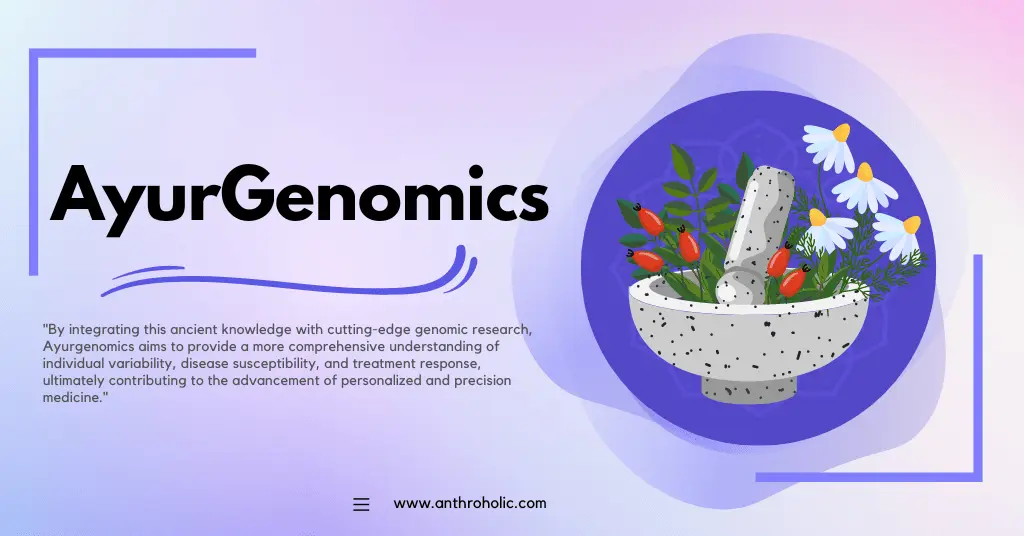AI Answer Evaluation Platform Live Now. Try Free Answer Evaluation Now
AyurGenomics
Ayurgenomics is an emerging field that combines the principles of Ayurveda, a traditional system of medicine originating in India, with modern genomics to enhance our understanding of human biology and improve personalized healthcare. Ayurveda, which has been practiced for over 5,000 years, relies on the concept of ‘Prakriti’ to classify individuals based on their physical, physiological, and psychological traits, enabling tailored therapeutic approaches for each individual. By integrating this ancient knowledge with cutting-edge genomic research, Ayurgenomics aims to provide a more comprehensive understanding of individual variability, disease susceptibility, and treatment response, ultimately contributing to the advancement of personalized and precision medicine [1].

The Concept of Prakriti in Ayurveda
In Ayurveda, the concept of Prakriti is central to understanding an individual’s unique constitution. Prakriti is determined by the balance of three biological energies, or ‘doshas’, namely Vata, Pitta, and Kapha, which govern various aspects of an individual’s physical, physiological, and psychological characteristics. Each person is believed to have a unique combination of these doshas, which remains relatively stable throughout their life and determines their predisposition to specific health conditions and their response to various treatments [2].
The three doshas can be briefly described as follows:
- Vata: Governs movement, circulation, and the nervous system. Individuals with a predominant Vata constitution are typically lean, agile, and creative but may be prone to anxiety and digestive issues.
- Pitta: Regulates digestion, metabolism, and body temperature. Individuals with a predominant Pitta constitution are usually of medium build, intelligent, and ambitious but may be susceptible to inflammation and skin problems.
- Kapha: Governs growth, structure, and stability. Individuals with a predominant Kapha constitution tend to have a heavier build, be calm and nurturing, but may be prone to obesity, congestion, and sluggish metabolism [3].
Ayurgenomics: Unraveling the Genomic Basis of Prakriti
Ayurgenomics aims to identify the genetic underpinnings of Prakriti and link these variations to specific health outcomes, disease susceptibility, and treatment response. Initial studies have identified several genetic markers associated with different Prakriti classifications, providing evidence for a biological basis to the traditional Ayurvedic system [4].
For example, research has shown that specific single nucleotide polymorphisms (SNPs) are more prevalent in individuals with a particular dosha constitution, suggesting a genetic basis for these classifications [5]. Additionally, studies have demonstrated that individuals with certain Prakriti types may have distinct gene expression patterns, which could help explain variations in disease susceptibility and treatment response among different Prakriti classifications [6].
Applications of Ayurgenomics in Personalized Medicine
The integration of Ayurvedic principles and genomics has the potential to significantly impact personalized medicine in several ways:
- Risk Prediction: By understanding the genomic basis of Prakriti, it may be possible to identify individuals at an increased risk for certain health conditions, enabling early intervention and prevention strategies.
- Treatment Selection: Knowing an individual’s Prakriti and associated genetic variations can help guide the selection of therapies that are more likely to be effective and less likely to cause adverse effects.
- Lifestyle Recommendations: Ayurveda emphasizes the importance of diet, exercise, and stress management in maintaining health and preventing disease. Ayurgenomics can help identify personalized lifestyle recommendations based on an individual’s Prakriti and genetic makeup [7].
Challenges and Future Directions
While Ayurgenomics holds great promise for personalized medicine, there are several challenges that must be addressed to fully realize its potential:
- Standardization of Prakriti Assessment: The accurate determination of an individual’s Prakriti is crucial for the successful application of Ayurgenomics. However, the assessment of Prakriti is currently based on subjective evaluations by trained Ayurvedic practitioners. Developing standardized, objective methods for Prakriti assessment is essential for the integration of Ayurveda and genomics [8].
- Larger Cohort Studies: The majority of Ayurgenomic studies to date have been conducted on relatively small sample sizes. To validate the associations between genetic variations and Prakriti classifications, larger, well-designed cohort studies with diverse populations are needed [9].
- Multi-Omics Integration: To fully understand the complex interactions between genes, environment, and lifestyle factors that contribute to an individual’s Prakriti, it will be necessary to integrate other omics data, such as epigenomics, transcriptomics, proteomics, and metabolomics, into Ayurgenomic research [10].
- Collaboration and Knowledge Sharing: The advancement of Ayurgenomics will require collaboration among researchers from various disciplines, such as Ayurveda, genomics, systems biology, and bioinformatics. Establishing platforms for knowledge sharing and interdisciplinary research will be essential for the growth of this field [11].
In conclusion, Ayurgenomics represents an exciting convergence of traditional Ayurvedic knowledge and modern genomic research. By unraveling the genetic basis of Prakriti and integrating this information with other omics data, Ayurgenomics has the potential to significantly advance personalized medicine, improve healthcare outcomes, and contribute to a more holistic understanding of human biology. However, addressing the various challenges and fostering interdisciplinary collaboration will be essential for the successful realization of this emerging field’s potential.
References
[1] Prasher, B., Negi, S., & Aggarwal, S. (2008). Whole genome expression and biochemical correlates of extreme constitutional types defined in Ayurveda. Journal of Translational Medicine, 6, 48. https://doi.org/10.1186/1479-5876-6-48
[2] Patwardhan, B., & Bodeker, G. (2008). Ayurvedic genomics: establishing a genetic basis for mind-body typologies. Journal of Alternative and Complementary Medicine, 14(5), 571-576. https://doi.org/10.1089/acm.2007.7083
[3] Frawley, D., & Lad, V. (2001). The Yoga of Herbs: An Ayurvedic Guide to Herbal Medicine (2nd ed.). Lotus Press.
[4] Ghodke, Y., Joshi, K., & Patwardhan, B. (2011). Traditional medicine to modern pharmacogenomics: Ayurveda Prakriti type and CYP2C19 gene polymorphism associated with the metabolic variability. Evidence-Based Complementary and Alternative Medicine, 2011, 249528. https://www.researchgate.net/publication/40693342_Traditional_Medicine_to_Modern_Pharmacogenomics_Ayurveda_Prakriti_Type_and_CYP2C19_Gene_Polymorphism_Associated_with_the_Metabolic_Variability
[5] Rotti, H., Raval, R., Anchan, S., Bellampalli, R., Bhale, S., Bharadwaj, R., … & Sule, M. (2014). Determinants of Prakriti, the human constitution types of Indian traditional medicine and its correlation with contemporary science. Journal of Ayurveda and Integrative Medicine, 5(3), 167-175. https://doi.org/10.4103/0975-9476.140478
[6] Mukerji, M., Prasher, B., & Patwardhan, B. (2019). Ayurgenomics: A new approach in personalized and preventive medicine. Science (New York, N.Y.), 353(6302), 985-986. https://www.researchgate.net/publication/228439943_AYURGENOMICS_A_NEW_APPROACH_IN_PERSONALIZED_AND_PREVENTIVE_MEDICINE
[7] Patwardhan, B. (2010). Ayurveda, genomics, and personalized medicine. Journal of Ayurveda and Integrative Medicine, 1(1), 8-9. https://doi.org/10.4103/0975-9476.59816
[8] Patwardhan, B., & Joshi, K. (2010). Ayurveda and systems biology: A future perspective. Ayurpharm Int J Ayur Alli Sci., 4, 1-6.
[9] Rotti, H., Guruprasad, K. P., Nayak, J., & Kabekkodu, S. P. (2018). Ayurgenomics for stratified medicine: TRISUTRA consortium initiative across ethnically and geographically diverse Indian populations. Journal of Ethnopharmacology, 211, 241-250. https://doi.org/10.1016/j.jep.2017.09.020
[10] Govindaraj P, Nizamuddin S, Sharath A, Jyothi V, Rotti H, Raval R, Nayak J, Bhat BK, Prasanna BV, Shintre P, Sule M, Joshi KS, Dedge AP, Bharadwaj R, Gangadharan GG, Nair S, Gopinath PM, Patwardhan B, Kondaiah P, Satyamoorthy K, Valiathan MV, Thangaraj K. Genome-wide analysis correlates Ayurveda Prakriti. Sci Rep. 2015 Oct 29;5:15786. doi: 10.1038/srep15786. PMID: 26511157; PMCID: PMC4625161.
[11] Patwardhan, B., & Mashelkar, R. A. (2009). Traditional medicine-inspired approaches to drug discovery: can Ayurveda show the way forward? Drug Discovery Today, 14(15-16), 804-811. https://doi.org/10.1016/j.drudis.2009.05.009



